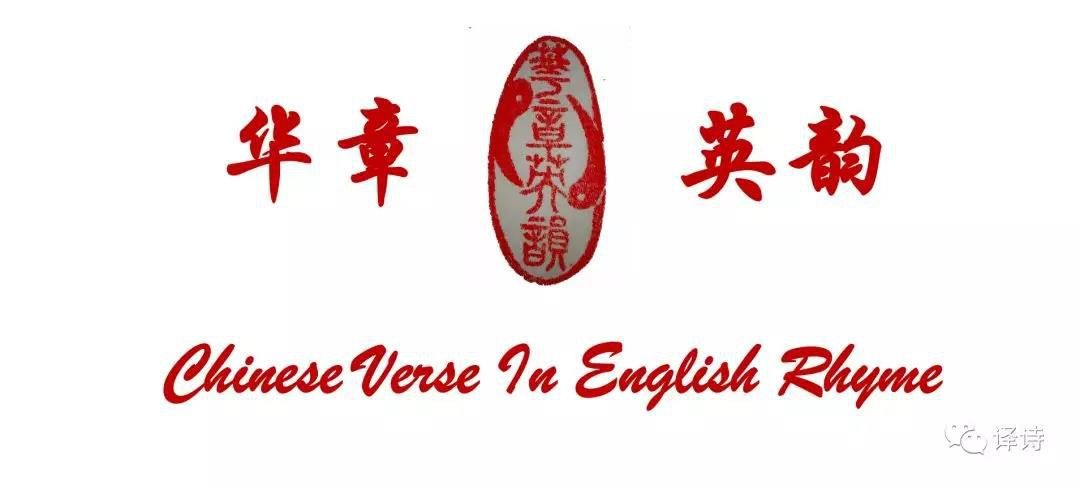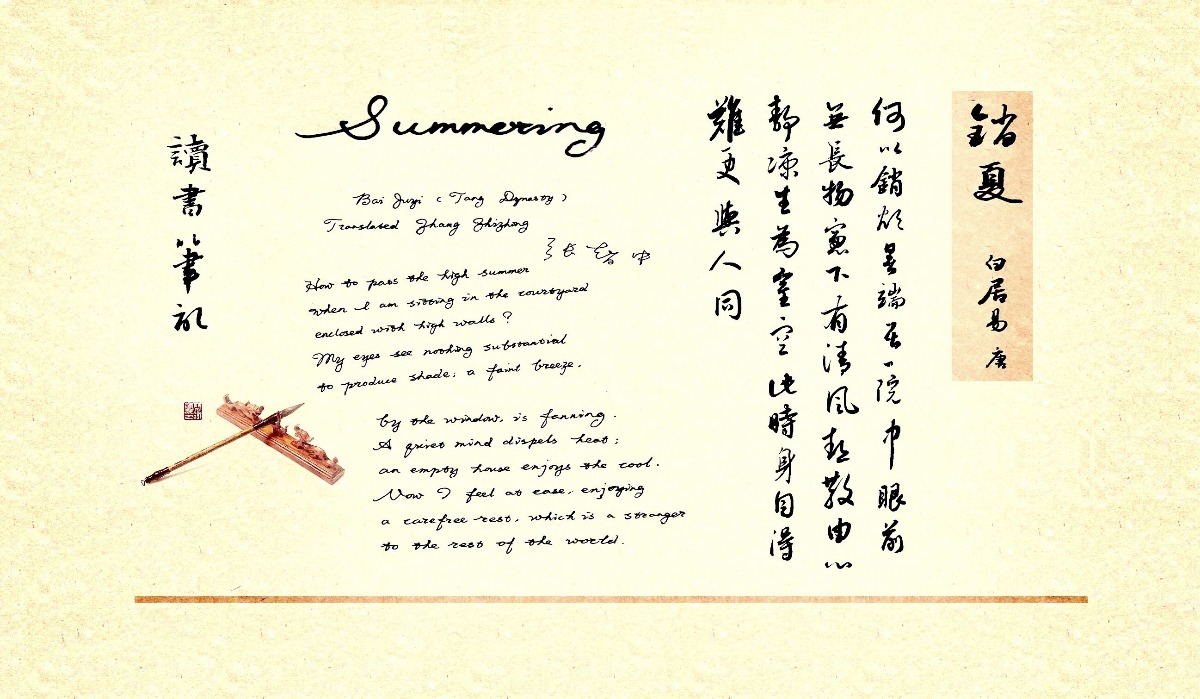本帖最后由 释圣静 于 2019-7-28 20:18 编辑
picname
主持人
王如利(Wang Ruli)
丁立群(Ding Liqun)
Introduction
炎炎夏日,何以消暑?各位读者,且随白居易一起“热散由心静,凉生为室空。”本期《华章英韵》特邀张智中教授执笔主译,张教授译文恰如原诗平易通俗,不拘泥于现在许多人追捧的韵译,如一缕清风给读者带来别样的惬意感受。
How to pass the high summer? Dear Reader, just as Bai Juyi says, “A quiet mind dispels heat; an empty house enjoys the cool.” For this issue of Chinese Verse in English Rhyme,we feel greatly honored that Prof. Zhang Zhizhong has accepted our invitation to translate the poem. Prof. Zhang's translation, free from any restraint of end rhyme that many Chinese translators try to pursue, is popular and accessible, just like the original poem, and like a breeze it will bring you a different and pleasant feeling.
picname
书法:蔡铁勇
销夏
(唐)白居易
何以销烦暑,端居一院中。
眼前无长物,窗下有清风。
热散由心静,凉生为室空。
此时身自得,难更与人同。
Summering
Bai Juyi (Tang Dynasty)
Translated by Zhang Zhizhong
How to pass the high summer
when I am sitting in the courtyard
enclosed with high walls?
My eyes see nothing substantial
to produce shade; a faint breeze,
by the window, is fanning.
A quiet mind dispels heat;
an empty house enjoys the cool.
Now I feel at ease, enjoying
a carefree rest, which is a stranger
to the rest of the world.
The Translator's Comment
原诗8行,译诗11行,原诗押韵,译诗自由无韵。不拘诗行不顾尾韵,虽为国内译者所恶,却吻合西方译诗潮流。
标题“销夏”的英译,采取summer的动词形式:“过夏天,避暑”之意。因此,summering, 简洁而形象。例如:We summered in the mountains.(我们在山中避暑。)
汉诗一、二行,对应英文How to pass the high summer when I am sitting in the courtyard enclosed with high walls? 汉语2行,英译3行出之,enclosed with high walls(高墙四围),乃深层之译,增补而出,强调“烦暑”之困扰。其中,形容词high重复,但语义略微不同,带来译诗的玩味之处。
汉诗三、四行,对应My eyes see nothing substantial to produce shade; a faint breeze, by the window, is fanning. 同样,汉语2行,英译3行。“无长物”在汉语中语义宽泛,相应的英文nothing substantial to produce shade(没有什么可以遮阴的实物)走向了具体。“清风”,英译a faint breeze ... is fanning, 如此搭配,带来新鲜的语感,特别是fanning(像扇子一样吹风),正描写了清风无计可销夏的微弱之风。另外,从音韵的角度而言,see, substantial 押头韵,shade, faint押元音韵,faint, fanning与breeze, by分别形成跨行头韵。如此音韵技法,在当代英诗中,远比尾韵更为常见。
汉诗五、六行,对应A quiet mind dispels heat; an empty house enjoys the cool. 大体直译,采用陌生化搭配,取得良好效果。这里的cool为名词,前置定冠词,往往表示“凉爽,凉气”之意。例如:enjoy the cool of the evening.(纳晚凉。)
汉诗七、八行,Now I feel at ease, enjoying a carefree rest, which is a stranger to the rest of the world. 再次,汉语2行,英译3行出之。“身自得”之英译,用了at ease和enjoying a carefree rest两个短语,乃充分翻译。英语词典上例句:Yaks are enjoying a carefree rest in the water.(牦牛在水中悠然自得。)随后的a stranger to the rest of the world(世人对此陌生),可能对国内读者的理解带来挑战,但对于熟悉英语-er类词语妙用的读者来说,却会带来惊喜之感。另外,这里的两个rest,词形相同,含义却异,也带来一定的语言审美效果。
总之,汉诗英译的终极读者,当为英美人士,那么,翻译策略便处处为其考虑。译诗像英诗,甚至像一流的英美诗人写出来的英语诗歌,才是译诗的真正成功。
There are 8 lines in the Chinese poem and 11 lines in the English version; the Chinese poem is with end rhyme and the English version is without end rhyme, free without any restraint. Translation without considering the number of lines and the end rhyme caters to Western readers instead of Chinese translators.
In translating the title of “销夏”, the verb of summer has been chosen, which means to spend the summer or to prevent sunstroke. Therefore, “summering”, as the title, is vivid and concise. For example: “We summered in the mountains.”
Lines 1 and 2 correspond the English version: “How to pass the high summer when I am sitting in the courtyard enclosed with high walls?” Chinese 2 lines into English 3 lines. “Enclosed with high walls” is added information, so as to highlight the heat of summer. And the word “high” is repeated with slight variance in meaning, which adds flavor to the translated poem.
The English version of lines 3 and 4: “My eyes see nothing substantial to produce shade; a faint breeze, by the window, is fanning.” Again, Chinese 2 lines into English 3 lines. “无长物” has a broad meaning, and its English counterpart “nothing substantial to produce shade” is much more concrete. The Chinese word “清风” has been translated into “a faint breeze ... is fanning”: such collocation brings a sense of novelty, particularly, “fanning” felicitously describes the weak wind which fails to subvert the height of summer. In addition, concerning rhyme, there is alliteration in “see” and “substantial”, assonance in “shade” and “faint”, as well as cross-line alliteration in “faint” and “fanning”, “breeze” and “by”. This kind of rhyming skill is more often seen in contemporary English poetry, compared with the end rhyme.
Lines 5 and 6: “A quiet mind dispels heat; an empty house enjoys the cool.” Literal translation is used here, and defamiliarization is effective here. When used as a noun, “cool” is often prefixed with a definite article to signify something cool or cold. For example: enjoy the cool of the evening.
Lines 7 and 8: “Now I feel at ease, enjoying a carefree rest, which is a stranger to the rest of the world.” Again, Chinese 2 lines into English 3 lines. In translating “身自得”, two English phrases have been used: “at ease” and “enjoying a carefree rest”, so as to bring out the rich meaning in the original. An example from the English dictionary: “Yaks are enjoying a carefree rest in the water.” The phrasing of “a stranger to the rest of the world” may defy understanding by the Chinese readers, yet the occasional use of such a word ending with -er usually brings a pleasant surprise to the English readers. Besides, the repetition of “rest” with different meanings also subjects the readers to an aesthetic experience in wording.
In short, the ultimate readers of C-E poetry translation are those from the English-speaking world, and in choosing a translation strategy, consideration is made for them. A successful translated poem should be, or at least aim to be a sterling English poem, even like a literary piece produced by a first-rate English poet.
The Translator
张智中,南开大学典籍翻译及译论研究方向博士,河南大学诗歌翻译博士后。现为天津师范大学翻译研究所所长、外国语学院教授。兼任《世界诗人》季刊客座总编,国际诗歌翻译研究中心副主席。出版编、译、著80余部,在外语类核心和其它重要刊物上发表学术论文100余篇,另有诗歌创作发表。2018年,专著《汉诗英译美学研究》获天津市第十五届社会科学优秀成果三等奖。主持并完成国家社科基金后期资助项目《汉诗英译美学研究》和天津市哲学社会科学规划课题重点项目《汉诗英译风格流派研究》,目前主研国家社科基金项目《汉语诗歌在英语世界的译介研究》。汉诗英译多走向国外,获国际著名诗人和翻译家的广泛好评。译诗观:但为传神,不拘其形,散文笔法,诗意内容;将汉诗英译提高到英诗的高度。
Zhang Zhizhong obtained a doctor's degree in translation studies from Nankai University, and he has done his postdoctoral study in aesthetics of poetry translation at Henan University. He is now director of Translation Studies Center of Tianjin Normal University, and professor of Foreign Languages College of Tianjin Normal University. Meanwhile, he is guest editor of The World Poets Quarterly and vice chairman of International Poetry Translation and Research Centre. Until now, he has published over 80 books and 100 academic paper. Besides, he has published his own poems. In 2018,his monograph An Aesthetic Study of C-E Translation Poetry won the third prize at the 15th Excellent Achievements in Social Sciences of Tianjin. He has finished An Aesthetic Study of English Translation of Chinese Poetry, a project funded by the National Social Science Foundation of China, and A Study of the Styles and Schools of C-E Poetry Translation, a key project funded by Tianjin Social Science Foundation. Now he is undertaking A Study of the Translation of Chinese Poetry in the English World, a project funded by the National Social Science Foundation of China. His English translation of Chinese poetry is widely acclaimed throughout the world, and is favorably reviewed by international poets and translators. His view on poetry translation: spirit over form, prose enjambment to rewrite Chinese poetry into sterling English poetry.
《中外诗文翻译》
中外诗文翻译:华章英韵、诗译新文化、新时代新诗歌、名家名译、英诗同题翻译、中国诗文外译、外国诗文汉译
主 办:中诗网、译诗群
协 办:月印无心佛教文化平台“太原头条”、大家网、金融街电讯新媒体头条
总顾问 :何功杰、李正栓、张智中、卓振英
总策划 :周占林、宛城卧龙
名誉主编:周占林
主 编:王磊、释圣静
名誉副主编:王永纯、德肋撒.李
副主编 :黄金珠、蔡铁勇
编 委:王如利、丁立群、晚枫、王琳、史潘荣、罗晓佳、赵直。
月印无心佛教文化平台编委会名单
佛教总顾问
照圆(智华)老上师
文化总顾问
傅天琳女士
法律顾问
徐延爽律师(女)
文化顾问
任立
大卫
刘枫
张富英
李成虎
宋彩霞女士
昳岚(张华)女士
金铃子(蒋信琳)女士
梅依然女士
路军锋
白恩杰
文殊
刘志成
王平华女士
石天
大枪
王永纯
名誉总编辑
子磊
高彩梅女士
罗晓红女士
高巧玲女士
原野
田诗范
总 编辑
释圣静
执行总编
琚 雪女士
常务副总编
郭淑萍女士
副 总 编
沙从兵
名誉主编
德肋撒.李女士
付海平女士
主 编
杨琀
常务副主编
石头汤女士
副 主 编
张新锐, 向思治
佛教文化国际交流部
主任:王磊( 宛城卧龙)
副主任:邹中海,陈金茂
责任编辑:柴义叶女士(一念花开)
简介
释圣静:俗名叶小兵。1971年生,现为中国诗歌学会、中国散文学会,中国音乐著作权协会,重庆市作家协会会员。‘月印无心’佛教文化平台总编辑。《已出版诗集《月印无心》《乐道》。
曾在上照下圆恩师座下修习礼法;曾礼山西省长治市郊区同兴寺住持上觉下空为授业恩师;在山西太原崇善寺住持上法下海恩师座下剃度出家。
picname
月印无心佛教文化平台
由月印无心QQ空间、月印无心直播间,月印无心佛教文化平台微博,月印无心微信公众号,以及《妙笔生花文化网一一月印无心佛教文化专栏》,都市头条‘太原头条.月印无心佛教文化平台’共同组成。 作为《作家报》《长河诗歌》,《天涯诗刊》的编辑巜追梦》杂志主编和大家文学网管理员的圣静师父,有向《作家报》《长河诗歌》巜追梦》杂志等合同作单位组稿和初审稿件,以及向《天涯诗刊》等刊物与网选发刊用文学作品的职责和义务!(无稿费,投稿视作同意使用)。
版权声明:本平台的图片和音频,以及视频等,除了注明作者名称的外,其它均来源网络,版权归原作者所有,若涉侵权,请联系删除!本文经作者授权发布,作者文责自负,与月印无心佛教文化平台无关!
温馨提示:本平台及释圣静所推荐的所有平台,为佛教文化或者文化公益平台。(本平合作单位有:《作家报》《天涯诗刊》杂志社,《长河诗歌》杂志社,《追梦》杂志,大家文学网,等均无稿费!凡投稿者视为同意本规则!
转载请注明来源:月印无心佛教文化平台及作者!报刊杂志(选集)等选用,请联系作者和月印无心佛教文化平台,违反上述声明者,将依法追究法律责任!
总编联系QQ邮箱:2649203026@qq.com
微信号:q18100347582
微信新号:q13389616903
QQ:2649203026
博客地址是:http://blog.sina.com.cn/u/6823737399
中国诗歌网主页地址:http://www.zgshige.com/c/2017-08-07/3981659.shtml
|
-

-

|

